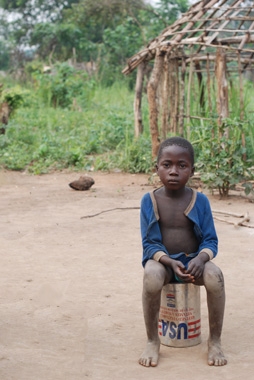
YAMBIO, Southern Sudan—As my colleague and I drove through the outskirts of Yambio, the capital of Western Equatoria state, we passed a large construction site where a tall brick wall formed a periphery around what appeared to be bleachers and a grandstand under construction. The expansive, flattened site was littered with trucks, tractors, and other construction equipment, and men were hard at work on the project.
Looking at the site as we drove by, I remembered a recent article in the Sudan Tribune noting that construction of the stadium was underway in Yambio for an important upcoming national event: the fifth anniversary of the signing of the Comprehensive Peace Agreement, or CPA, which ended more than two decades of war between Sudan’s North and South.
Each year since the CPA was signed, a different state capital in Sudan has hosted the anniversary celebration, which draws politicians from the NCP and SPLM (the two Sudanese signatories to the CPA) and other political parties, soldiers from the North’s Sudanese Armed Forces and the South’s Sudan People’s Liberation Army, as well as traditional chiefs, international diplomats, and other guests. Construction work is clearly in high gear to prepare for the event in Yambio on January 9.
Just down the road from the stadium, in a green and forested area, we stopped on a small side road cutting through a settlement of more than 500 people. These people were displaced by Lord’s Resistance Army attacks in Western Equatoria this year, which are destabilizing this once peaceful and verdant state that reportedly “fed all of southern Sudan” during the North-South war. We learned from an elder in the settlement that most of the people had fled from two rural areas, Sakure and Gangura, both less than 50 kilometers south of Yambio near the Congolese border. Given their makeshift huts and shelters, many of the people appeared to be fairly recent arrivals in Yambio.
After hearing the stories of some of these people, it was clear to us that they were internally displaced persons, or IDPs, badly in need of basic services such as potable water, food, and, in NGO jargon, “non-food items,” or “NFIs,” not to mention schools for their children. Some of the people we spoke to said they ran on foot from their homes seeking safety in Yambio after they saw their neighbors’ skulls smashed by invading LRA fighters. They fear to return to their homes, yet they say they are ashamed to have to beg for food, because their ethnic group, the Azande, are known to be skilled farmers. One man said that the LRA looted his village and harvested his crops, which is why he had to flee into the town of Yambio, where there is not enough food or space to cultivate crops. Although people in the settlement have begun growing various greens and sorghum in an attempt to provide for themselves in the absence of any outside assistance, the food they are growing is not enough to feed this entire displaced population.
The local pastor who was serving as our interpreter told us that the Episcopal Church of Sudan owns this land and offered it to incoming IDPs who had nowhere else to run. According to international law, a government is responsible for protecting its own people when they are displaced within the county’s borders, but neither the Government of Southern Sudan nor the Western Equatoria state government is providing services to this vulnerable community. The U.N. refugee agency cannot serve this displaced group because they are not refugees—people who have crossed an international border.
Regardless of definitions or humanitarian acronyms or protocol, the Sudanese people squatting outside of Yambio need help. It was ironic to see an enormous construction process financed by the Government of Southern Sudan and the Western Equatoria state government – apparently to the tune of $30 million – underway in shouting distance from this makeshift camp. Some of the small children in the camp look as though they may not live to hear the commotion from the January 9 CPA celebration. When I tried to ask through our translator if Joanna, a mother of seven children who fled the village of Sakure in May while pregnant, if she had heard of the CPA, she looked confused. “She has not heard,” said our translator.
It’s unsurprising that Joanna has not heard of the CPA. After all, she fled “war,” as she put it, earlier this year. What happened in her home was a brutal as anything that occurred during Sudan’s recent civil war. I wonder what the people in this nameless settlement will think when they hear the noise of the CPA celebration in Yambio.

